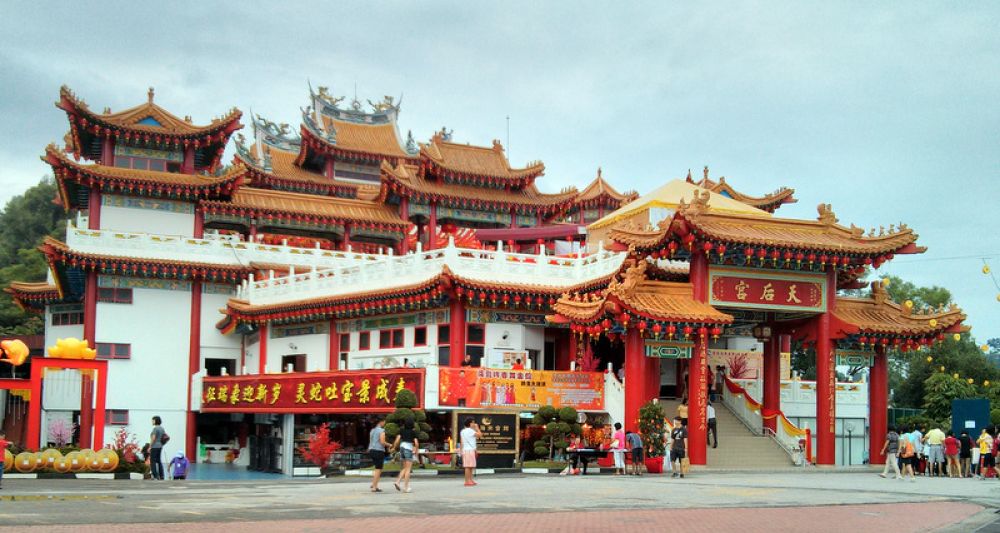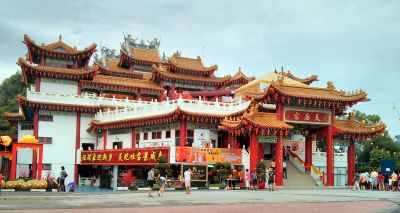

The Thean Hou Temple comes alive during the Lunar New Year with thousands of visitors coming to offer prayers for prosperity and good health. As one of the most important festivals in the Chinese calendar, the temple is adorned with red lanterns, auspicious decorations, and bright lights, creating a festive atmosphere. Visitors can observe traditional lion dances, dragon dances, and cultural performances that include Chinese opera and martial arts displays. The event also has stalls selling festive goods, food, and traditional crafts. Engage in the custom of 'bai nian', where individuals exchange well-wishes and partake in the communal spirit of the season.
Marking the middle of the autumn season, the Mid-Autumn Festival at Thean Hou Temple is an enchanting experience. Visitors can marvel at the display of countless lanterns that illuminate the temple grounds, symbolizing the full moon and conveying blessings of unity and harmony. It is an ideal time for families to gather and watch the full moon, a tradition believed to bring good fortune. The temple offers mooncakes, a delicacy associated with the festival, representing the full moon's perfection. Attendees can participate in lantern-making workshops and lantern riddles, which are a highlight of the event.
Vesak Day, also known as Buddha Purnima, is a significant day for Buddhists as it commemorates the birth, enlightenment, and passing away of Gautama Buddha. The Thean Hou Temple holds special observances and rituals where devotees perform acts of generosity, such as releasing captive animals and taking part in prayers and chantings. There's also a candlelight procession around the temple, providing a serene and contemplative environment. Devotees and visitors alike can absorb the calming chants and fragrant incense, partaking in a spiritual experience that embodies compassion and peace.
The Thean Hou Temple isn't just a place for festivities; it also offers regular teachings on Buddhism and meditation sessions for those seeking spiritual growth or respite from the hustle and bustle of city life. These educational and experiential sessions are conducted by learned monks and teachers who guide visitors through the teachings of Buddhism and techniques of mindful meditation. The calm and serene atmosphere of the temple grounds provides the perfect backdrop for these enlightening sessions, promoting personal well-being and spiritual connection.
Chap Goh Mei is celebrated on the fifteenth day of the Lunar New Year, marking the end of the festive season. At Thean Hou Temple, this event is commemorated with enthusiastic revelry and various cultural activities. Visitors can witness traditional Chinese cultural practices such as the tossing of mandarin oranges into the sea or a lake by single women, which is believed to attract a good husband. The temple is often filled with performances, including lion and dragon dances, and is beautifully decorated with red lanterns and ornaments to symbolize luck, joy, and prosperity for the coming year.
During the Mid-Autumn Festival season, Thean Hou Temple hosts workshops for making mooncakes, a traditional Chinese pastry filled with sweet bean paste or lotus seed paste and yolks from salted duck eggs. These workshops provide an immersive experience, teaching participants the art of mooncake preparation and the history behind this centuries-old delicacy. Under the guidance of skilled instructors, visitors can learn how to create the perfect mooncake, from preparing the dough to intricately shaping and baking them. This is a family-friendly activity that combines culinary skills with cultural learning.
With its stunning architecture and beautifully landscaped garden, Thean Hou Temple is a popular spot for wedding photography. Couples can capture their special moments against the backdrop of the temple's ornate structures, intricately carved pillars, and colorful murals. While the primary function of the temple is for worship, the picturesque setting makes it an ideal location for creating unforgettable matrimonial memories. Photographers can be seen directing bridal parties to position against the temple's best features, ensuring each photo is as striking as the setting itself. The use of the site for photos is generally integrated with the temple's open and welcoming atmosphere.
The serene surroundings of Thean Hou Temple provide an idyllic setting for the practice of Tai Chi, an ancient Chinese martial art known for its health benefits and meditative movements. The temple offers regular Tai Chi classes conducted by experienced practitioners. These classes cater to all skill levels, from beginners to advanced participants. Practicing Tai Chi at the temple not only helps in reducing stress and improving balance and flexibility but also offers participants a chance to connect with Chinese culture and philosophy. Joining these classes can be a refreshing way to start the day, surrounded by the temple's peaceful ambience.
Thean Hou Temple is not only a place of worship but also a cultural landmark steeped in history. Guided tours of the temple provide an insightful look into the architectural and spiritual significance of this six-tiered temple. Visitors can learn about the temple's design that incorporates elements of Buddhism, Taoism, and Confucianism. The tour guides share stories about the deities worshipped within the temple and the temple’s role within the Chinese Malaysian community. Exploring the prayer halls, pagodas, and the grandiose main hall can offer a deeper understanding of the site's cultural heritage.
The Thean Hou Temple occasionally hosts a vegetarian food fair, promoting healthy living and compassion towards animals. The fair features an arrayivetarian dishes from various Chinese traditions and sometimes other Asian cuisines, allowing visitors to indulge in a variety of flavorful and ethical food options. Attendees can explore the stalls set up within the temple grounds, each offering different types of vegetarian delicacies, from mock meats to traditional vegetable-based dishes. The fair not only serves as a gastronomic delight but also encourages discussion about the benefits of a vegetarian diet in line with Buddhist teachings of non-harm.
